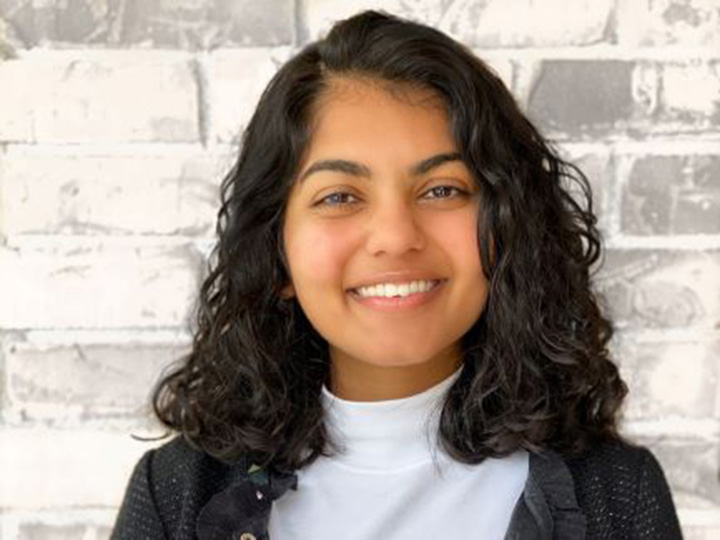Pharis Fellowship Student Saloni Patel

Saloni Patel is currently a senior at the University of Houston. She majors in Honors Biomedical Sciences and is interested in health. Patel joined the Pharis fellowship due to her fascination regarding the interconnection between data science and community health. The fellowship has prepared her in multiple ways. Her aspiration is to attend medical school and to work in health care. Patel hopes to utilize what she has learned from the fellowship to help and serve disadvantaged communities in the future.
- What inspired you to major in biomedical science? What made you interested in the UH Honors college?
SP: Upon entering UH, I knew that I wanted to pursue a career in the health professions. Biomedical sciences seemed like a natural entryway into this career pathway. The major is actually integrated into the Honors College. UH Honors was attractive to me because of the Human Situation course. I had always appreciated the importance of the Humanities in any profession, and the UH Honors College's commitment to introducing students to themes about the human condition was really refreshing.
- How did you discover this fellowship? What is your favorite part of the fellowship?
SP: I discovered the fellowship through the Honors College newsletter. I believe it was around March when I completed the application, and the Fellowship seemed so unique because it seemed to blend data science and community outreach. This truly was my favorite part of the fellowship -- the fact that we could help solve some crucial issues impacting the Houston community using data analytics methods.
Prior to this fellowship, I never had the opportunity to integrate community outreach into my research until I participated in the Pharis Fellowship program. This was a valuable experience and I'm so glad I could engage in a new type of research. Also, the Fellowship gave us a platform to engage in insightful conversations about relevant social issues. The instructors encouraged us to create separate channels on MS Teams dedicated to social justice, education, community health, etc. We could hop on these channels and discuss socially relevant issues with our peers. Not only did this inform my personal research project on education, but it also allowed me to meet and learn from other fellows.
- Explain your project. In what ways will it impact the community?
SP: My project investigated Dual Language and ESL programs in secondary schools throughout Texas. Spanish-speakers make up an increasing percentage of secondary school students in Texas. There are currently two predominant programs administered in schools to help English learners become proficient -- Dual Language (DL) and ESL programs. As it turns out, it's actually easier to learn a new language if it is done through an individual's native language. Through my research project, I was able to demonstrate that Spanish-speaking English learners enrolled in DL programs have higher yearly progress gains on the TELPAS exam than Spanish-speaking English Learners enrolled in ESL programs in Texas secondary schools.
I hope this finding will impact communities by emphasizing the unique needs of English learners and encouraging more school districts to expand their DL programs to a greater number of schools, because they seem to be more effective in helping English learners become proficient. This is really important when it comes to long-term education gains for Spanish-speaking students because English proficiency does set up students for academic success considering standardized tests are largely administered solely in English. The great benefit of the DL programs is the learners will not need to abandon their existing Spanish-speaking abilities and can retain an important part of their culture.
- What are your future goals? How will this project affect your goals and potential career path?
SP: I'm currently in the process of applying to medical school and I hope to work as a physician in the future and serve marginalized, underserved communities around Texas. In addition to seeing patients, I hope I can also work as a medical educator and teach students. Working on this project has made me more attentive to the unique needs of English learners. I hope to take what I've learned and apply it to a clinical and educational setting to provide culturally-responsive care for patients and students.
This project shows the different learning abilities people possess and what might work for one group of students certainly will not work for other groups. Our education system is still largely English-centric and does not value the ability to speak Spanish and other languages as much. It values the sole ability to speak English -- hence the higher prevalence of ESL programs compared to DL programs in schools. I've learned that this is one of the flaws in our education system, and likely in society at large. Being aware of this issue, as I interact with patients and students in the future, will hopefully allow me to provide care that recognizes their needs.
- Why should other students join this fellowship?
SP: I would really encourage other students to apply to this Fellowship because it will mold them into a culturally and socially-responsive individual, and a better researcher. The Fellowship is structured in a way that emphasizes engagement with other students. This level of engagement transcends your individual research project and delves into important conversations about social issues. Taking in the diverse insights of those around you will help you create an amazing research project that can make an impact on the community. You may come into the Fellowship thinking about social issues, whether it's education or health care but you'll probably exit with a much wider perspective on these issues. This is a really valuable and meaningful way to learn about the world around you.
Click here to see Saloni Patel’s winning poster.
News Category
Institute Happenings
Research
Research Topics